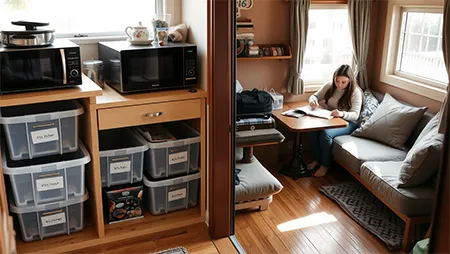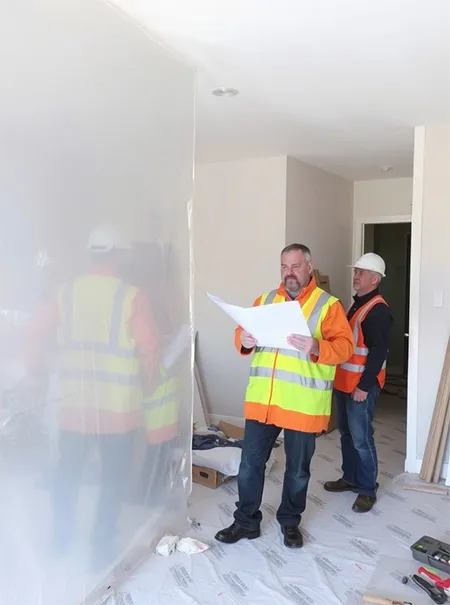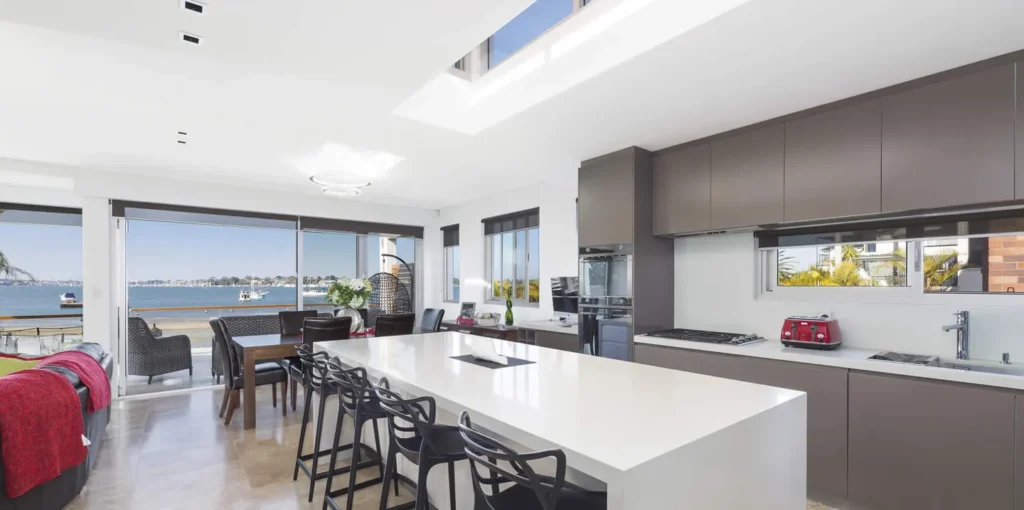One thing is how not to lose your sanity while renovating a house; add kids, and it’s a recipe for disaster.
Renovating a house with a family can quickly become challenging. Some projects inherently exceed their budget and timelines, testing your family’s patience. Managing home renovations becomes complex with children around.
Your renovation plans might range from a $210,000 extension to a $45,000 kitchen upgrade. Success depends on proper preparation. We suggest you plan 6-12 months before the actual work starts. This timeline gives your family enough time to adapt to upcoming changes and pivot if unforeseen circumstances arise.
This advice outlines our proven strategies for maintaining family harmony during renovations. You will learn to create temporary living spaces and manage daily routines effectively, which will help you stay calm while transforming your house into the family-friendly space you desire.
All building and construction differ in complexity, and our guide advice is for small—to mid-sized home extensions and renovations where we can accommodate your family living in a basic environment. Staying off-site is always preferable, but a rental property is not always possible with the current housing crisis were experiencing on thee Gold Coast and surrounding northern coastal regions.
Planning Your Family-Friendly Home Renovation
Spring is the perfect season to kick off your home renovation project. You are with school holidays coming up. Experience shows that family renovations succeed best when planning carefully and considering what everyone needs.
Setting a realistic timeline with kids in mind
If you renovate multiple rooms at once, your home can become chaotic. The best approach is to liaise with the building contractor to determine the best approach at a given time. This keeps dust and mess contained in a single space. Parents can take turns—one can take the kids to the park, beach, their friend or cousin’s home, or even shops while the building contractors focus on renovation tasks.
These timing strategies work well for more mid-sized renovation projects:
- Do messy work during school breaks
- Schedule noisy tasks around sleep times
- Split projects into manageable phases
- Leave extra time for delays
Creating zones for family activities
Your renovation plan should match how each family member uses different spaces. Open floor plans help you keep an eye on your children and stay connected as a family. You’ll need specific areas for:
- Quiet spots away from construction zone(s) and noise, where possible
- Homework and study corners
- Play spaces visible from kitchen or living areas
- Smart storage to keep toys tidy
Windows must be strategically placed to give clear views of outdoor play areas. Kids’ space needs change faster as they grow—toddlers and teenagers need different things. Your spaces should adapt quickly over time.
Making a kid-proof renovation budget
A wise budget starts with materials that can handle daily wear and tear. Pick:
- Stain-resistant upholstery fabrics
- Long-lasting flooring like laminate or tile
- Easy-to-clean wall treatments and paint
- Non-toxic sustainable materials with low-VOC or zero-VOC labels
Your costs should include safety features like:
- Corner protectors for sharp edges
- Strong mounting brackets for heavy furniture
- Childproof cabinet locks
- Safety gates for stairs and doorways
Let your children join in age-appropriate renovation tasks. They can pick colours for their rooms or help with simple jobs, making them feel included.
Timing matters, too—spring and summer offer more outdoor play options. Your kids can easily stay away from construction zones. Set aside some money for temporary solutions like makeshift play areas or extra storage during renovation.
This approach prioritises your family’s needs while keeping everyone safe. Your timeline and budget should allow room to handle unexpected challenges during family renovations.
Setting Up a Temporary Living Space
Making your home liveable during renovations means creating temporary spaces that feel like home. Properly setting up these interim living areas can make a huge difference between chaos and calm.
Creating a makeshift kitchen

Here’s what you need for cooking:
- A plug-in induction hob or portable cooker for safe cooking
- Microwave and toaster for quick meals
- Electric kettle for hot drinks and instant foods
- Mini fridge or relocation of your existing refrigerator
Setting up sleeping areas
Comfortable sleeping spaces are vital to keeping your family happy. Your bed might sit on the floor temporarily, but it can make a big difference in comfort. You can try these arrangements.
- Pick one room as a dust-free sleeping zone
- Use regular mattresses instead of airbeds for better sleep
- Install air purifiers to curb construction dust
- Build “Places of Peace” – small sanctuaries away from construction
Families sharing temporary sleeping quarters need good organisation. Clear containers make it easy to find bedding and clothes during the disruption. You can turn these spaces into calming retreats by:
- Adding comfortable seating
- Playing soothing music
- Using essential oil diffusers to mask construction Odors
A designated ‘liveable’ space away from renovation chaos helps you keep your daily routines.
More extensive major renovations might require multiple zones in your temporary space. The secret is to keep at least one safe room with minimal dust and noise. This space becomes your family’s sanctuary and gives you a break from the renovation experience. You should protect these areas from construction chaos to keep them liveable throughout your home changes.
Managing Daily Family Life During Renovation
Your home becomes a construction zone, and keeping daily routines is vital. I’ve found that consistent patterns help children feel secure when their home is being renovated.
Keeping meal routines
Regular mealtimes are the foundation of family stability. A study reveals that in their daily schedules during renovations. Here’s how you can curb this challenge:
Make a weekly meal plan with simple recipes that need minimal prep time. Keep shelf-stable items like peanut butter, microwavable rice pouches, and instant oatmeal on hand. You can also cook larger batches of meals to eat over several days.
For breakfast and lunch, choose:
- Pre-cut vegetables and pre-cooked proteins
- Shelf-stable microwavable meals
- Fresh fruits and granola
- Sandwich ingredients
Safety First: Protecting Your Kids
Keeping kids safe during home renovations needs careful attention to safety measures. As a parent, I’ve been through major renovations and know how crucial it is to create safe spaces that protect our kids from danger.
Setting renovation boundaries
Physical barriers are the first line of defence against child injury. Gates or barriers prevent curious toddlers from entering construction zones. Of course, your renovation team needs to know your kids’ ages and mobility to implement the proper safety measures.
These boundary-setting strategies will help keep your kids safe:
- Lock doors to work areas
- Put up solid barriers between living and workspaces
- Keep power tools and materials in airtight containers
- Cover up electrical sockets and sharp edges
- Watching what contractors do, especially when doors are open
Creating dust-free zones

Start by sealing off work areas with plastic sheeting and masking tape. Your barriers should go from floor to ceiling to effectively trap dust. Cover all air ducts and returns, too—this stops dust from spreading through your home.
To protect your space better:
- Keep air purifiers running 24/7
- Check dust barriers often for tears or gaps
- Use protective film on carpets
- Keep living areas well-ventilated
- Get noise-canceling headphones if your kids are sensitive to construction noise
A shop vacuum with a dust attachment should be your daily cleaning companion. Wipe surfaces with a damp cloth to catch settled dust. Taking shoes off at the door stops construction debris from getting into clean areas.
Remember that dust doesn’t stop with demolition – cutting and sanding wood, concrete, and gyprock creates lots of it. So stick to strict cleaning routines throughout your home renovation project. These detailed safety steps will help protect your kids while you work on making your dream home a reality.
Working With Renovation Teams
Your home renovation’s success depends on teaming up with the right construction crew. My experience shows that building contractors who get what it means to work around kids make a substantial difference in your renovation trip.
Choosing family-friendly contractors
You need certified building contractors to ensure quality work and keep your family safe. Start by checking if potential contractors have proper licenses and insurance and follow regulations. Risen Developments, a family-run business, shows what you want in a renovation building contractor – they put client needs first and adapt their work style.
Here are the questions you should ask when talking to potential contractors:
- Do you clean up well after each workday?
- How do you keep dust from spreading to other areas?
- What safety practices do you follow?
- Have you worked around children before?
Let your kids meet the renovation team to create a more relaxed atmosphere. One parent puts it well: “Your children will feel more relaxed about having people in their home if they become their mates, and hopefully the renovation team will be extra considerate of the small people kicking around their workplace”.
Building Construction teams can be amazingly flexible with family schedules. For example, some crews wrap up by 3 p.m. daily so families can have peaceful evenings. But asking them to stop completely during sleep times isn’t practical and could add substantial costs.
Your project needs good communication through:
- Regular progress meetings
- A shared digital calendar for key dates
- Clear chain of command
- Written records of decisions and changes
Talking regularly with your building contractor helps avoid delays and surprise costs. Risen Developments, another respected family business, shows their steadfast dedication to meeting client needs through active communication and community support.
Pick contractors who understand family needs and encourage open communication to make your renovation smoother for everyone. Your chosen team should maintain high safety standards and understand the unique challenges of renovating with kids around.
Conclusion
Craig Preston, Master Builder on the Gold Coast
Renovating your home with children requires careful planning, patience, and innovative strategies. Our experience shows that successful family renovations rely on four elements: proper preparation, comfortable temporary spaces, regular daily routines, and solid safety measures.
Parents who renovate successfully know they must pick the right time, create spaces for kids, and carefully plan their budget. Of course, setting up dust-free zones and clear boundaries helps keep children safe during the work.
The right building contractors make a huge difference in family renovations. These professionals are Risen Development. We know how to work around children and adapt methods. We’ve completed thousands of home renovations and learned the best ways to guide parents through a family-friendly project. You can contact us today online or at 0407 REN 0V8.
A renovation might shake up your daily life, but good planning and safety steps will bring your family closer together. You’ll soon enjoy your updated space and build new memories in a home that fits your family perfectly.
The team at Risen Developments, led by Master builder Craig Preston, has been helping families for over 30 years to create the ideal house renovations. See how the team can help you with your next home renovation or rebuild project. No job is too big, and all projects comply with the Australia, Queensland and New South Wales regulator guidelines. We do not use ANY shot cuts in our building proceeds; see what Risen is your FIRST choice in your next building or renovation and construction project!
🏡 Frequently Asked Questions
How long does it take when renovating a house?
Most house renovations take longer than expected. A kitchen remodel can last 4-6 weeks, while a bathroom, bedroom, or lower-floor extension update typically spans 3-6 months. Planning for your project to take 2-3 weeks longer than initially estimated is best because when we open up older homes, we often find structures that are not up to code or have shoddy workmanship done.
How can I minimise dust during renovations?
To minimize dust, your building contractor will seal off work areas with plastic sheeting or heavy-duty tarps. When occupation within the Reno is required, use air purifiers, cover air ducts, and have contractors clean up daily. Consider setting up a window fan to blow dust outside. Vacuum and wipe surfaces regularly to control dust spread.
How can I stay within my renovation budget?
Set a realistic budget and add 10-25% for contingencies. Prioritise essential updates over cosmetic changes. Keep track of all expenses and avoid making changes mid-project to prevent cost overruns. Building contractors will help when budgets need to be stretched, so chat with them early if a budget or pricing problem comes to light.
How can I maintain family routines during a renovation?
Set up temporary living spaces, like a makeshift kitchen. Maintain regular mealtimes and designate quiet areas for homework and sleep. Communicate openly with family members about the process and involve children in age-appropriate aspects of the renovation to help them feel included.
Looking for a related topics of Advice we’ve covered?.
Home Extension Ideas: Expert Guide to Double Your Living Space in 2026
Modern house extension trends moving into 2026 are all about squeezing in as much bright,...
Seven steps to planning your home renovation
Whether it’s a home renovation, adding a second floor, installing a new kitchen, or extending...
Why Your Home Renovation Building Designs Might Be Costing You Money [Expert Guide 2025]
Gold Coast homeowners who undertake home renovations and building design May Be Costing...










